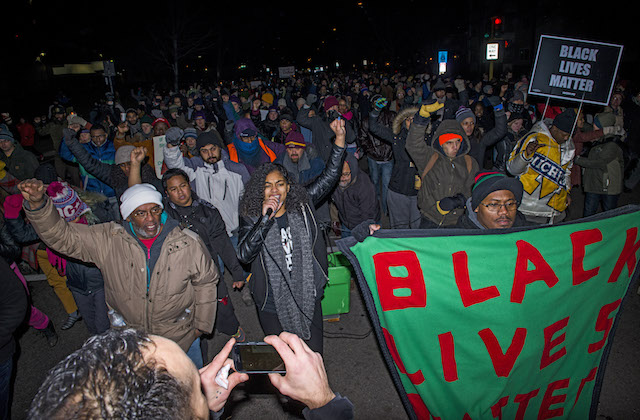This City Just Banned Grand Juries for Police-Involved Deaths

After months of protests in response to the death of Jamar Clark—a 24-year old unarmed Black man—at the hands of two Minneapolis police officers, the Midwestern city has decided to do away with the grand jury process for police-involved deaths.
Protestors, lead by Black Lives Matter Minneapolis, have repeatedly asked Hennepin County prosecutor Mike Freeman to forgo the grand jury in the decision to indict the officers who killed Clark on November 15, 2015. Yesterday, Freeman announced that not only will he not use the grand jury process—which is criticized for a lack of transparency and abysmal track record when it comes to indicting officers—for Clark’s case, but that he will no longer use grand juries for any cases where officers kill civilians.
Freeman released a statement yesterday (March 16), detailing his decision:
To use or not use a grand jury in police shooting cases is a hard decision for me. We have used grand juries in Hennepin County for at least the last 40 years in police shooting cases. On one hand, to have 23 people make a factual decision versus just the prosecutor and his team has appeal. After all, the law that applies is exactly the same whether the facts are applied to that law by a grand jury or a prosecutor. On the other hand, our society, and this prosecutor, believes accountability and transparency are critical concepts for a just and healthy democracy. …
I concluded that the accountability and transparency limitations of a grand jury are too high a hurdle to overcome. So, at this point in time, and in a democracy where we continually strive to make our systems fairer, more just and more accountable, we in Hennepin County will not use the grand jury in the Jamar Clark case.
I will make the factual determination whether there is sufficient evidence to support a criminal charge against the police officers in the tragic death of Jamar Clark. I will make that determination with the excellent assistance of senior attorneys in our office and the fine work of law enforcement, most notably, the BCA and FBI.
This is my job and I will do it as fairly as I can. To repeat, there will not be grand jury proceedings in the Jamar Clark case.
I am making this decision only for Hennepin County. As I mentioned earlier, there are strong reasons to use a grand jury in some cases. And other communities may feel the use of the grand jury in police shooting cases is appropriate. The authority to make those decisions lies with each elected county attorney. For me, grand juries should no longer be used in police shooting cases in Hennepin County.
Freeman will make the decision on the indictment himself. He also said in the statement that he began a review of the grand jury system 16 months ago, and that his department was set to announce an update that would add transparency to the mix back in November—but tabled it after Clark was killed. “The ensuing months have given me more time to think about the grand jury. As an elected official, I also took that time to meet with more people and listen to their concerns,” Freeman said in the statement.
Chief among those with concerns were activists working with Black Lives Matter Minneapolis, who occupied the police precinct in the district where officers Mark Ringgenberg and Dustin Schwarze killed Clark during a domestic dispute. Organizers are happy with the decision, but took to Twitter to say that the victory belongs to the protestors who held officials accountable:
Be absolute clear: Mike Freeman didn't do this. Black, Queer, Femme Youth and their allies did this. #NoGrandJury #Justice4Jamar
— Black Lives MPLS (@BlackLivesMpls) March 16, 2016
Freeman is in his fifth term as county attorney. Citypages reports that there are no cases of a Minneapolis officer ever being indicted for committing murder while on duty. Freeman did not announce a timeline for making his decision in the Clark case.
(H/t ThinkProgress)
